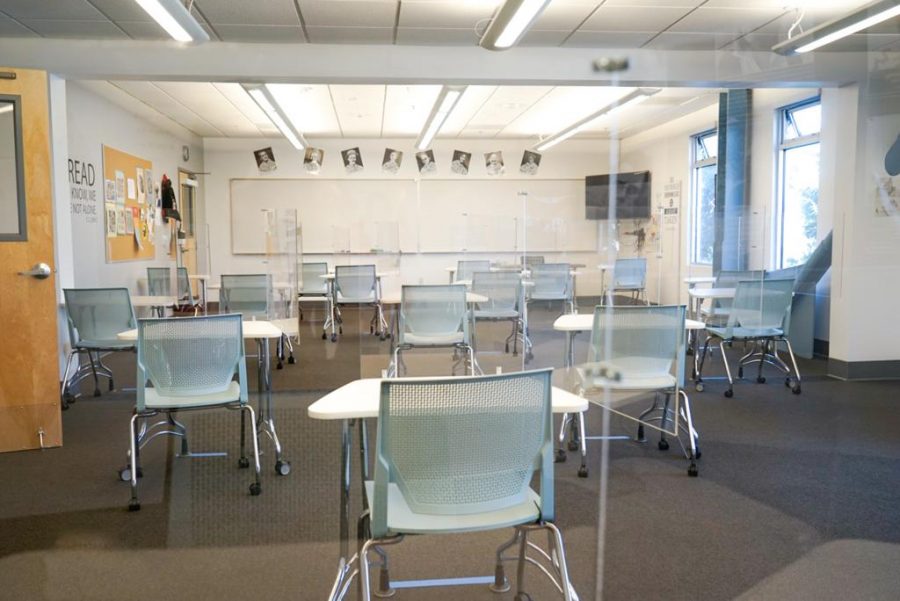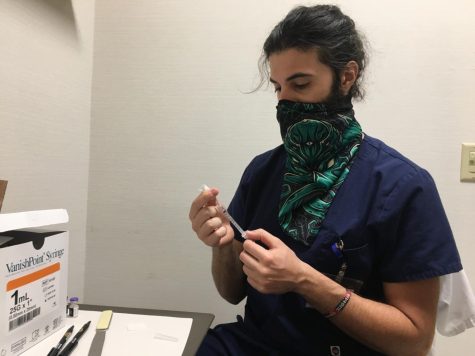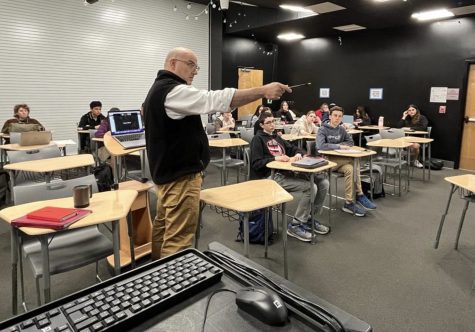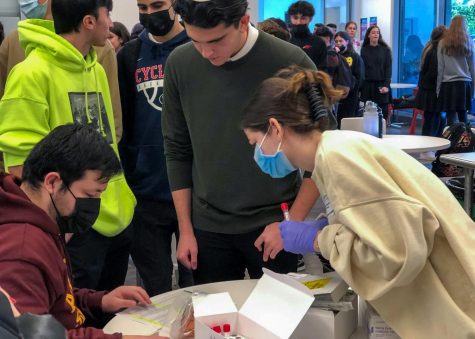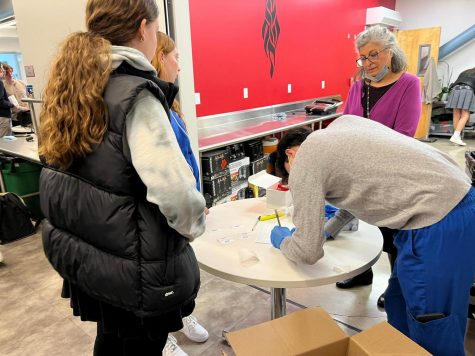COVID 2.0: Online classes, after-school “camp” and Zoom shofar-blowing welcome new school year
With endless trips, Shabbatons, pep rallies and spontaneous kumzitzes in the hallways, Shalhevet always feels a little like camp.
This year, for parts of the day, it actually is.
Although academic classes will begin online, Shalhevet is planning optional in-person programs on campus starting next week, called “Camp Firehawks.” They’ll run from 4:30 to 7:35 p.m. Sunday through Thursday and include davening, special seminars and co-curriculars.
With the new remote-only class schedule ending those days at 3 p.m., Camp Firehawks will start at 4:30 with Mincha and end at 7:35 with Ma’ariv, according to an Aug. 14 email from Rabbi Block. In between will be first Torah learning at 4:50-5:30, then enrichment classes taught by Shalhevet teachers at 5:40-6:20, and then regular co-curricular activities from 6:30-7:30.
The in-person after-school program is just one of one of many major changes for the new school year, which follows four months of online-only school that started March 16. School begins tomorrow entirely online, as mandated by the state of California in counties that are on its coronavirus “watch list.”
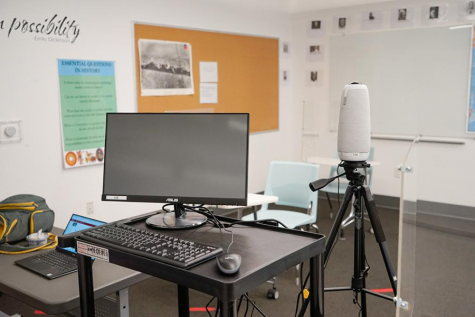
Rabbi Block said Camp Firehawks, which will start next Monday, Aug. 31, would be a safe way for students to come to school if they wanted to.
“We want to have an opportunity to engage with our students,” said Rabbi Block. “And right now … school learning is only online, and we wanted to create an opportunity that was obviously within the guidelines.”
General Studies Principal Mr. Daniel Weslow said that there would be some Sunday offerings as well, including drama, basketball, and online physical education.
State Covid guidelines allowed day camps to be open throughout the summer, and health departments have not acted to close them even in counties on the state coronavirus “watch list.” Los Angeles County is one of several dozen still on the list as of Aug. 25.
Rabbi Block announced Camp Firehawks in an email Aug. 14.
“We’re thrilled to announce the launch of Camp Firehawks – an after-school in-person program meant to nourish our students spiritually, intellectually, and physically,” the email stated.
While formal co-curriculars like debate, choir and drama will meet during Camp Firehawks time slots, what Rabbi Block called “student-run clubs” have been given a period at the end of the online school day, from 3:15 to 3:50 p.m. These include the Business Club, Young Americans for Freedom, and Firehawks for Israel.
“Clubs will still be online — clubs have a separate spot in the schedule,” Rabbi Block said. “Those are things that are student-run, usually run during the school hours.”
The enrichment, or “seminar,” slot is meant for students to have a more personalized learning with teachers who might be teaching a large class on Zoom. Officials have yet to announce the names or teachers of these enrichment classes.
“The seminar slot is really a slot for those classes that are a little bit larger to have one on one or small group meetings with those students to just make sure that they are connecting with every student and no one is getting lost in those larger classes,” said Rabbi Block.
Rabbi Block said that when in-person school is allowed again, a lot of the activities at Camp Firehawks might be replaced by regular learning — but he wasn’t sure.
“Honestly, it’s hard to know the answer,” he wrote in an email to the Boiling Point. “This situation and health guidelines are ever-changing, and our educational decisions will continue to evolve along with them. Our after-school Torah and Enrichment programming was conceived of once the health guidelines no longer allowed our hybrid in-person school model. Once in-person school is allowed, we’ll revisit and design a system that best fits the guidelines and maximizes student learning.”
For that to happen, LA County must be removed from California’s county watchlist and then go for an additional 14 days of declining cases.
At that point, Rabbi Block said, Shalhevet plans to move to a “hybrid learning” plan, with half the school on campus at a time so there’s more room for social distancing.
Shalhevet plans to bring freshman and sophomores to campus one week while the juniors and seniors learn at home on Zoom, and the the next week juniors and seniors would be on campus while freshman and sophomores learn virtually.
Here are some other changes students will discover this year:
- For students who still want to learn from home — and for teachers who’d like to teach from school while everyone’s learning at home — Shalhevet has purchased eight “owl” units, microphone-like devices with 360-degree cameras and microphones that pick up sound from all around the classroom.
When an “owl” is on, the teacher can move around the classroom normally and still be seen, and viewers at home can manipulate their view to see whoever is talking at a given time.
Rabbi Block said that during hybrid learning, no more than eight classes will take place on campus at a time — four per grade, with only two grades present — so every teacher will have one. Teachers can also use them to teach during online learning from school if they wish.
- For the first day of school, Wednesday morning Shalhevet is offering two davening locations to pray together before the start of the school year. Shacharit will begin at 7:30 am at Shalhevet on the upstairs patio and for kids who live in the valley at Rabbi Gormin’s home.
- All sudent desks in the building are spaced six feet apart from each other, many with two-sided plexi-glass dividers shielding the front and sides. The dividers were built over the summer by school maintenance chief Jose Flores.
- Renovations were made over the summer to create larger classrooms when students move to the hybrid model. Classrooms 205 and 206 were merged into one classroom by removing the wall in between. Also the third-floor teachers lounge has been converted into a classroom.
- The main circular staircase in the building is now designated only for students going up, while the outside parking lot staircase and the back staircase to the gym may be used for walking down. The new rules regarding staircases are to make sure students stay distant around the building.
- It’s Elul, when the shofar is normally blown every morning to help with spiritual preparation for the High Holidays. Rabbi Block said that minyanim would include shofar-blowing via Zoom, and that during in-person davening someone would blow the shofar from a distance with a mask over the outside end to prevent spreading possible aerosolized virus.
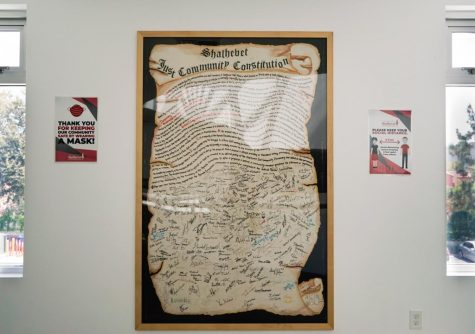
REMINDERS: Signs on either side of the Just Community constitution on the second floor remind students to wear a mask and maintain social distancing. (BP Photo by Ellie Orlanski) - For the first time in Shalhevet history, Town Hall will be meeting every two weeks instead of weekly, but it’s not clear whether the change is temporary or permanent.
Agenda Chair Kate Orlanski said Just Community adviser Rabbi Ari Schwarzberg suggested the change, but she was not sure how long it would last.
“Rabbi Schwarzberg suggested this to me in the summer because we were trying to figure out what was the best way we could get people engaged in Town Hall,” said Kate in an interview. “And given the fact we are also having the camera-on policy, and we really want people to be engaged, we thought the best way to kinda compromise would be to make it every other week.
“We just thought that timeline made more sense, plus it’s much more difficult to produce Town Halls when we’re not in person so also a matter of efficiency and what we’re physically able to do.”
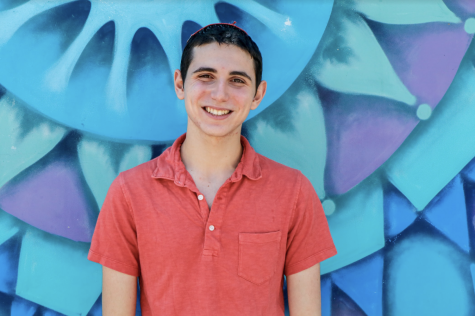
Benjamin Gamson, 12th grade, is in his second year as an Editor-in-Chief of the Boiling Point, having served last year as only the second junior to hold that post himself. Benjamin joined the Boiling Point during his freshman year as a staff writer and became Polling Director during the second semester. As News Editor in his sophomore year, Benjamin managed and edited the Community, Torah and Outside News sections.
Benjamin has authored over 70 articles and podcasts and won awards from organizations including AJPA, JSPA and NSPA. Outside of Boiling Point, he is a member of the Model Congress team and an active participant in the Just Community. When not in school, Benjamin enjoys following politics, current events and baseball, and listening to music.

